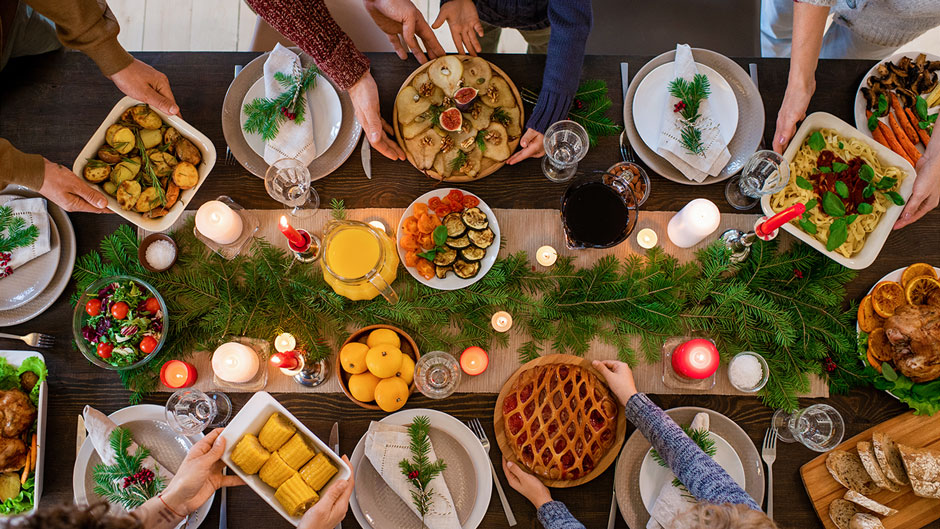The coronavirus pandemic has upended most people’s lives. One unhealthy result of being lockdown at home was weight gain. Unruly eating and snacking took a toll on almost everyone.
A survey conducted in February 2021 by the American Psychological Association found that 32 percent of U.S. adults reported undesired weigh gain since the start of the pandemic, with an average gain of 29 pounds.
While many are still struggling to get rid of excess weight added by the pandemic, along comes the holiday season with multiple celebrations that feature food and alcohol, tempting everyone to indulge. So how can we approach these days ahead and not overeat?
Most dietitians suggest that mindful eating is crucial to avoid overeating.
“Planning ahead is always important,” said Maddison Saalinger, registered dietitian with the University of Miami Diabetes Research Institute. “If not, you can go wild.” Preplanning includes eating before going to any holiday event, she noted.
“Many people do not eat earlier in the day because they know they are going to a party,” she said. That is a mistake. Going to a party hungry can be disastrous.
“Make sure you eat a good breakfast and lunch before going to the party,” Saalinger warned. She also suggested that you should not linger by the snack table. Doing so can encourage mindless nibbling.
Arlette Perry, professor in the Department of Kinesiology and Sport Sciences at the School of Education and Human Development, said that she believes portion control and eating more unprocessed, whole grain foods is helpful in trying to maintain or lose weight.
“I would try to swap out fatty red meats for broiled or baked fish and/or roasted turkey. I would also recommend wholesome plant-based protein sources such as tofu, tempeh, or seitan which are really healthy alternatives. In terms of taste, limit butter and use herbs, salt and pepper, and healthy oils—such as avocado oil—instead to add flavor,” Perry said.
Traditional foods like turkey with stuffing are fine if people use less butter, more olive oil, and different herbs and spices during baking that enhance the flavor and taste, Perry pointed out.
If it is possible to bring your own food to the celebration, as in a potluck dinner, then bring a vegetable dish, said Saalinger. Besides being low in calories, vegetables are an excellent source of fiber and makes one feel full, she added. Dark green leafy vegetables such as spinach, kale, broccoli, and chard are especially good.
Many people enjoy their turkey dinners with sweet potatoes topped with marshmallows and brown sugar. Perry said that while sweet potatoes are very healthy with plenty of beta carotene and potassium, cutting back on the toppings, sugar, and butter is important to avoid the extra calories.
Many in the Hispanic community enjoy Nochebuena (a Christmas Eve celebration) and look forward to the traditional food—the lechon (suckling pig), rice and beans, and yuca (a root tuber), as well as the dessert turrones (nougat) and the drink coquito (cream of coconut with alcohol).
Most of these dishes are laden with calories so choosing what you eat with care is important, said Saalinger.
“Portion control is crucial in this situation,” she said. “You can have a small piece of each offering—for example, sticking to just one platanito. The desserts tend to be so sweet that only a small amount will do. Choose the smallest piece or cut it in half and share it with someone.”
Others may prefer to eat macaroni and cheese as a side dish. Perry suggested that, in general, limiting the amount of butter, lard, and brown sugar is the best way to go. If that is not possible, then downsizing the portion is helpful, Saalinger acknowledged.
Here are some other tips that Perry and Saalinger provided to help reduce the calorie intake.
- Use small plates for what you choose to eat. Having a full plate fools the brain into thinking that it is getting a lot.
- Cut back on alcohol. Sip on sparkling water or plain water in between drinking alcoholic beverages to minimize the number of high-caloric drinks.
- Use a plate method to balance what you eat. Fill up half the plate with vegetables, a quarter with protein, and a quarter with carbohydrates.
- Avoid bread and soda if you anticipate eating carbs during the main meal.
- Walk daily to maintain your physical activity during the holidays. Many people take a break from exercise during this time. Lack of exercise decreases calorie expenditure and increases the chance of weight gain.

